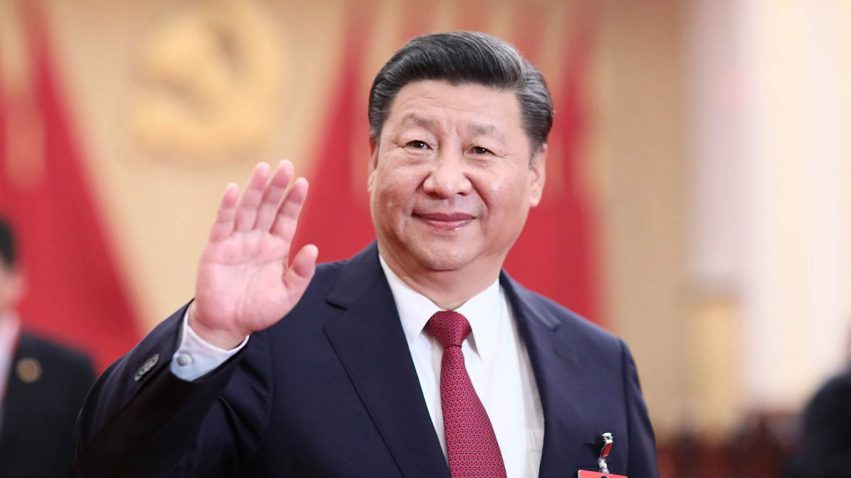 By scmp (25 February 2018) – China will remove the constitutional restriction on the maximum number of terms the president and vice-president can serve, Xinhua reported on Sunday, paving the way for President Xi Jinping to stay on beyond 2023.
By scmp (25 February 2018) – China will remove the constitutional restriction on the maximum number of terms the president and vice-president can serve, Xinhua reported on Sunday, paving the way for President Xi Jinping to stay on beyond 2023.
The official news agency said the ruling Communist Party had proposed removing the line that the president and vice-president “shall serve no more than two consecutive terms” from the constitution.
Xinhua later released the full 4,480-word proposal in Chinese. The document, which will be considered by the legislature next month, was dated January 26 – a week after the party’s 200-strong Central Committee met to discuss revisions to the constitution.
Xinhua did not say why it took a month to release the document to the public.
Xi, 64, was re-elected as general secretary of the party in October and is expected to be handed a second term as president by the legislature during its annual full session starting on March 5.
The party has in recent decades largely observed an unwritten retirement age of 68 for its top leaders, but its charter does not have any limit on terms. That means there are no restrictions on the general secretary position, but the Chinese constitution does limit presidents to a maximum of two five-year terms.
Analysts said ending the two-term limit gives the strongest indication yet that Xi will stay in power longer than his recent predecessors at a time when the leadership was “fixated on stability”.
There was intense speculation in the lead-up to the party’s five-yearly congress in October over whether Xi would continue to lead the party beyond two terms, with some questioning whether his ambitious plans to “rejuvenate” China could be achieved within 10 years.
Deng Yuwen, former editor of the Study Times newspaper affiliated with the Central Party School, said the proposed change was a strong signal that Xi planned to stay on.
“This is a very clear sign that the president will remain in office beyond the existing term limit. We don’t know if it could be life tenure at this stage,” Deng said.
Kerry Brown, director of the Lau China Institute at King’s College London, said recent developments in so-called stable democracies in the West may have provided some justification for the party to seek further stability and continuity.
“Trump, Brexit, the rise of the extreme right and left again in polities throughout the democratic world … made domestic Chinese politics even more fixated on stability and on avoiding any kind of uncertainty and risk,” Brown said. “Xi is the symbolic figure at the centre of this, the person whose leadership everything hangs on.”
State-owned tabloid Global Times said in an editorial that removing the two-term limit could help maintain the system of the party boss, president and military chief roles being held by the same person.
“Over the past two decades, a trinity of leadership consisting of the CPC Central Committee general secretary, president of the nation and chairman of the CPC Central Military Commission has taken shape and proven to be effective,” the editorial said.
“Removing the two-term limit of the Chinese president can help maintain the trinity system and improve the institution of leadership of the [party] and the nation.”
But amid concerns that scrapping the limit would mean a president could stay in the role for life, the editorial cited an unnamed authority as saying: “The change doesn’t mean that the Chinese president will have a lifelong tenure.”
Sunday’s announcement follows a Politburo meeting on Saturday and comes ahead of Monday’s three-day Central Committee plenum to discuss personnel and other proposed institutional changes to be tabled at the upcoming parliamentary gathering in Beijing.
Xinhua also reported that the party proposed to write Xi’s political theory – Xi Jinping Thought on Socialism with Chinese Characteristics for a New Era – into the constitution. It also planned to list the new super anti-graft body, the National Supervisory Commission, as a state agency in the constitution.
While the party is seeking to end the presidential term limit, one sentence will be added to the constitution to highlight the importance of its leadership, Xinhua reported.
“The leadership of the Communist Party of China is the defining feature of socialism with Chinese characteristics,” the new paragraph reads.
A clause could also be added on China “working to build a community with a shared future for humanity”, as well as saying it will “adhere to a peaceful development path and a mutually beneficial and open strategy”.
Separately, at a study session attended by the 25 members of the Politburo on Saturday, Xi talked about the “important role” of the constitution, according to Xinhua.
“No organisation or individual has the power to overstep the constitution or the law,” Xinhua quoted Xi as saying.

